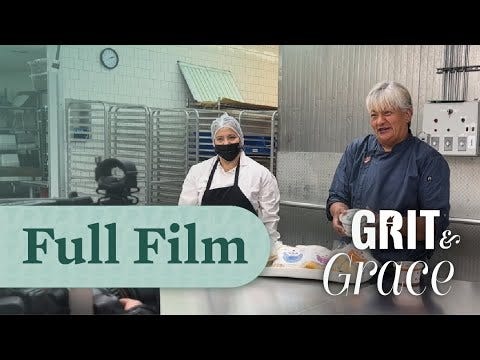Watching this documentary, a first of its kind for Congress, is an uplifting way to spend 30 minutes.
This one-half hour documentary prepared by the “Economic Disparity and Fairness in Growth” House Select Committee of the 117th Congress , and titled, Grit and Grace: The Fight for the American Dream, seems to suggest there are ways to close the income and wealth gap and help the arc of our economy bend toward fairness. Warning: Some of the examples show government-sponsored programs helping people!
While the committee did prepare a robust report of it’s accomplishments, it also produced this documentary as a way to touch more people, in ways that statistically produced data illustrated on nifty charts and graphs, simply cannot. Instead, it focused on the individual stories of three Americans who suffered various types of adversity, financial and otherwise, and seem to have persevered with hard work and some government help.
I’ve written quite a bit on Crime and Punishment about the ever-widening wage and wealth gap and the economic disparity it creates in our country — and for good reason. When the “haves” own so much that the “have-nots are left with almost nothing to even aspire to, it perpetuates and increases the vicious cycle of poverty. And the poverty of even a few, hurts us all. To help drive home this point, the Chairman of the Select Committee on Economic Disparity and Fairness in Growth”, Representative Jim Himes (D. CT), stated a simple fact to preface the committee’s report: “In the wealthiest country in the world, most people are struggling economically.”
A few “modest proposals”1to narrow the wealth gap floated by one political party are to raise taxes on the extremely wealthy, close tax loopholes that allow rich individuals and corporations to avoid paying their fair shares of taxes and support unions and wage increases for average workers.
In fact, President Biden’s 2023 Budget as originally proposed, included several such provisions to help transition our economy to a more equitable one. According to this Business Insider article, Biden’s initial budget for this year included proposals to raise taxes on the 0.1% and tax “unrealized gain” at the capital gains tax rate of 20%, increase funding to anti-trust agencies to break up monopolies and restrict corporate stock buybacks. As far as I can tell (and according to sources summarizing the 4,000 page bill), none of these provisions made it into the $1.77 trillion fiscal year 2023 spending package President Biden signed into law on December 29, 2022. If you can document otherwise, please let me know.
In a Tweet posted just a week before President Biden signed his deflated 2023 budget, the Economic Policy Institute summarized the increasing income gap with the following statistics from 2021 — wages rose all right, but mainly for the tip-top earners, and the rest had a pay cut. And this was before inflation really took off and decimated any wage increases earned during the worst of the Covid shutdown, when workers had a touch of bargaining power.

Yet, a Democratic majority Congress apparently did nothing to make the tax code more fair, extend the lapsed child care credit that pulled millions of families with children out of poverty or pass a long-overdue increase in the minimum wage. Granted, some incremental progress was made on retirement savings rules, veterans’ health care and a few other areas.
I keep thinking of that wonderfully crazy movie, Adaptation, a hyper-fictionalized account of Susan Orlean’s creative non-fiction masterpiece, “The Orchid Thief”. I actually took notes on the film, and one of the lines I wrote down could apply here:
Adaptation is a profound process. It means you learn how to thrive in the world.
Admittedly, adaptation in the natural world takes millennia and does occur incrementally, at least most of the time, but millions of our citizens are hurting now, while only a few could be described as “thriving” in the world we’ve created. Here’s to adapting a little faster in 2023.
————————
I’d love to hear your thoughts on the latest budget bill, the exploding wage and wealth gap, the Congressional documentary, Grit and Grace, the film Adaptation or any related topic you think is important to discuss. Let ‘er rip in the Comment Section below!
As always, I appreciate your interest and thoughtful ideas that make our Crime and Punishment community a welcoming space to visit and chat. There’s no time like the present to become a free or paid subscriber…and there’s no time like the New Year to Upgrade your free subscription to paid — it’s easy, and will allow me to continue and expand Crime and Punishment. Thanks in advance for your support!
The original “Modest Proposal” by Jonathan Swift: https://www.readwritethink.org/sites/default/files/resources/30827_modestproposal.pdf













Share this post